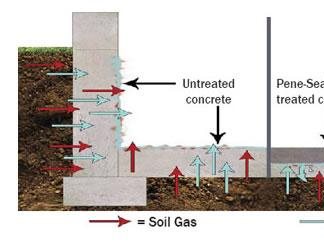- Staining Concrete
- Stamped Concrete
- Concrete Overlays
- Concrete Resurfacing
- Concrete Polishing
- Concrete Dyes
- Colored Concrete
- Indoor Concrete
- Concrete Floors
- Concrete Countertops
- Garage Floor Coatings
- Furniture, Sinks, Fire Bowls
- Basement Floors
- Outdoor Concrete
- Concrete Patios
- Concrete Driveways
- Concrete Pool Decks
- Outdoor Kitchens & Counters
- Outdoor Fireplace
- Concrete Walkways
- Concrete Pavers
- Concrete Walls
- Repair & Maintenance
- Foundation Repair
- Concrete Crack Repair
- Concrete Sealers
- Building with Concrete
- Concrete Homes
- Concrete Basements
- Decorative Concrete
- Fire Resistant
#1 Problem in Finished Concrete Basements: Moisture
Taking care of existing moisture problems prior to ANY work is begun on the basement renovation is an absolute must. While this is arguably the least pleasant of any facet of a finished basement project, it is also the most critical. This is because no matter how much effort is put into the project in terms of design, materials and finishes, moisture will contribute to the humid air, mildew, and other factors that will always make it feel like a basement, and not a comfortable living space.
Small cracks in foundation walls can allow moisture penetration. So can water pressure from the ground forced up through the unsealed concrete slab. However, often the most common moisture-related problem is condensation collecting on walls or pipes.
Since condensation is caused from warm humid air coming into contact with cooler surfaces, prevention and removal work hand-in-hand in alleviating this condition. Increasing ventilation, covering exposed water pipes with tape or foam insulation especially made for this purpose, and installing framing and wall insulation on foundation walls to prevent the humid air from coming into contact with the damp concrete walls are two ways to prevent condensation from occurring. The best way to remove humidity from the space is with an electric dehumidifier. Portable, compatible with a standard 110v system, and relatively inexpensive (about $100 to $300), these compact units can go far in removing humid air from the basement.
If groundwater is seeping through the foundation walls or through the floor, the condition will have to be remedied prior to finishing the basement. Most basement waterproofing can be done from the inside using spray-on products like (RadonSeal - LastiSeal Penetrating Brick and Masonry Sealer). If the condition is severe, however, exposing the exterior side of the foundation walls through excavation, and then damp-proofing or water-proofing the walls may be the only alternative.
Related Information:
For new construction (to avoid future water problems) read: Waterproofing or dampproofing basements





